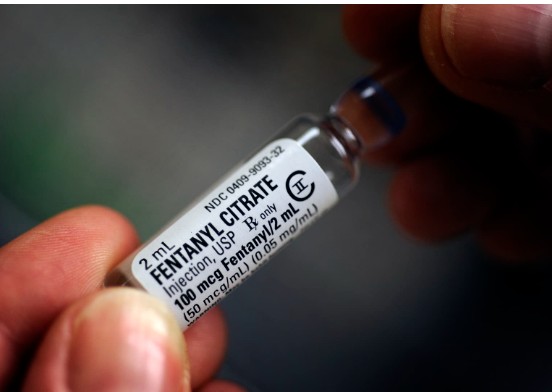China Responds to Trump’s Latest Tariff Threat Over Fentanyl Crisis

In a sharp rebuke to the latest U.S. tariff threat, China has accused the United States of engaging in “tariff pressure and blackmail,” as tensions continue to rise over trade and the flow of fentanyl into the U.S. On Friday, Chinese officials voiced their strong opposition to President Donald Trump’s announcement of additional tariffs on Chinese imports, which could take effect as early as Tuesday.
Trump’s decision to slap an additional 10% tariff on Chinese goods follows his administration’s ongoing battle to curb the deadly fentanyl epidemic in the U.S. According to the U.S. government, a large portion of the fentanyl flooding the country comes from China, although China has increasingly cracked down on the production and export of this dangerous synthetic drug. Nevertheless, the U.S. maintains that not enough has been done to prevent the illegal exportation of fentanyl and other opioids into the American market.
The proposed tariffs are set to coincide with the beginning of China’s annual parliamentary meeting, which is expected to announce the country’s economic priorities for 2025. This timing has added an extra layer of political complexity to the situation, as the U.S. tariff threat looms large just before the unveiling of China’s economic roadmap.
In response to the threat, Beijing condemned the move, calling it an act of pressure designed to force China into compliance with U.S. demands. “Tariff pressure and blackmail are not acceptable solutions to resolve differences between countries,” stated a spokesperson for the Chinese Ministry of Foreign Affairs. The spokesperson went on to reaffirm China’s commitment to fighting the illegal trafficking of fentanyl, while also expressing frustration over the U.S.’s “unilateral and protectionist” stance.
The new tariffs, which would add to the existing 10% tariff imposed on Chinese imports on February 4, are the latest escalation in the trade war between the two nations. While the U.S. has emphasized the need for China to do more to stop the flow of fentanyl, China has long argued that the issue is more complex than just trade tariffs and that broader international cooperation is required to combat the global opioid epidemic.
As the deadline for these tariffs approaches, the situation remains fluid. The question now is whether China will retaliate with its own set of tariffs or whether diplomatic channels can be used to defuse the escalating tensions. Beijing has previously responded to U.S. tariffs with its own retaliatory measures, and many analysts are watching closely to see if a similar response will come in the wake of Trump’s latest announcement.
The economic impact of these escalating tariffs could be far-reaching. If implemented, they could further strain trade between the world’s two largest economies, affecting global supply chains and potentially leading to higher prices for consumers.
For both nations, the stakes are high. The U.S. seeks to address the ongoing fentanyl crisis and curb China’s role in the illicit drug trade, while China sees the tariffs as an unfair attempt to impose political pressure and disrupt its economic stability. With the U.S. deadline looming, both sides will have to decide whether to take the path of negotiation or further escalation.
As the situation continues to develop, the world watches, knowing that the outcomes of these trade and diplomatic maneuvers could have lasting implications not only for the U.S. and China but for global trade and the ongoing battle against the opioid crisis.

cheap voip service to india https://otvetnow.ru lap band los angeles
https://askoff.ru
https://qtjpqhtfcs.wordpress.com
https://xrsaugpsya.wordpress.com
https://gxvkxeawwa.wordpress.com
https://azacgxicis.wordpress.com
https://cxadxqpked.wordpress.com
https://akiwdiycje.wordpress.com
https://iqakruyprf.wordpress.com
https://dgaiyziytk.wordpress.com
https://hrjcdfdcvj.wordpress.com
https://wryxvrrhxe.wordpress.com